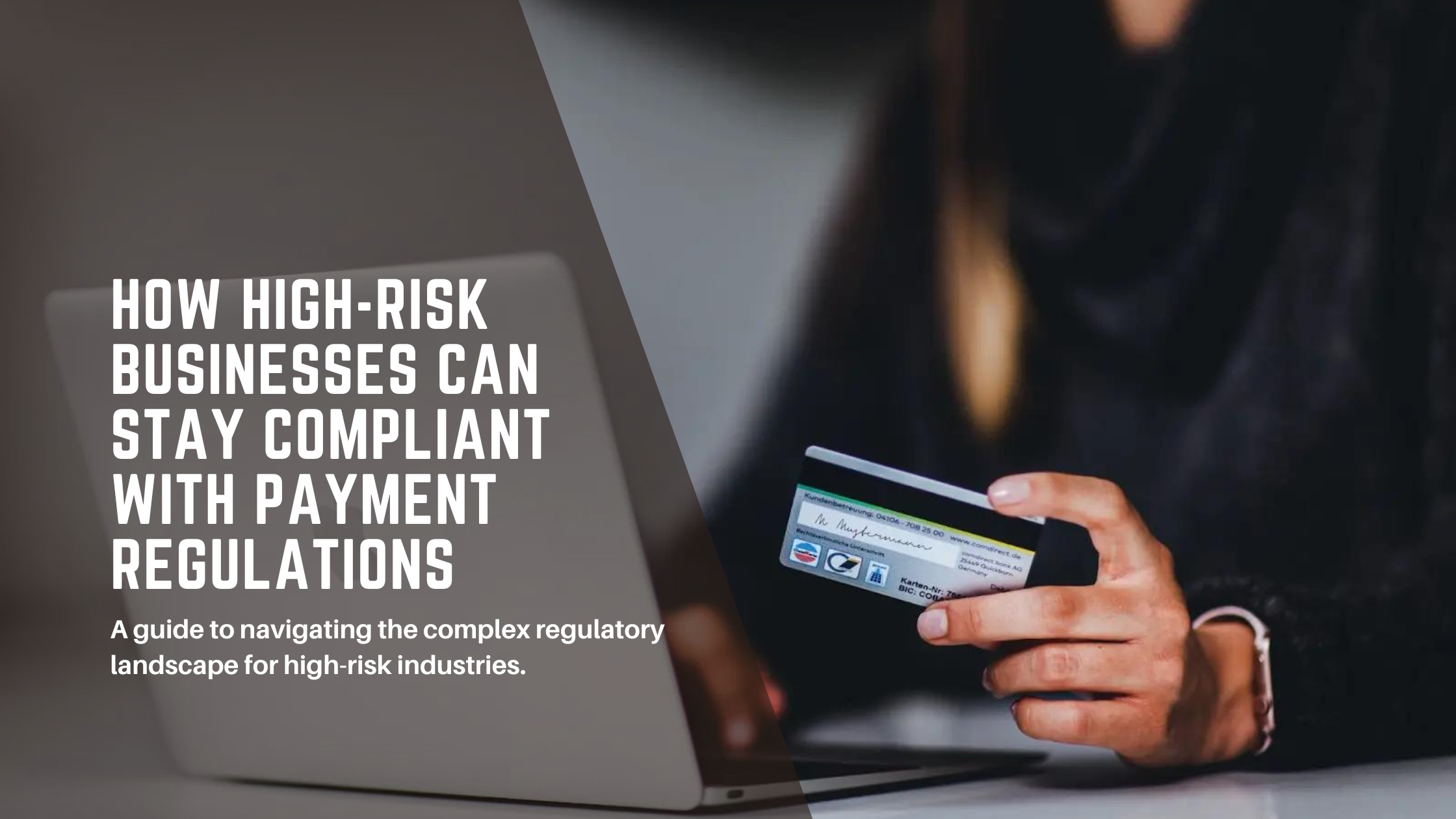January 17, 2026

-
Written by: Merchant Connect UK
- September 25, 2024

How High-Risk Businesses Can Stay Compliant with Payment Regulations
Operating in a high-risk industry, such as iGaming, adult services, cryptocurrency, or nutraceuticals, presents unique challenges—especially when it comes to staying compliant with payment regulations. Payment processors and acquiring banks often have strict requirements for high-risk businesses, and failing to comply with these rules can result in hefty fines, account closures, or even legal action.
Navigating the complex regulatory landscape is essential for maintaining smooth payment processing and safeguarding your business’s reputation. In this guide, we’ll explore the key regulatory challenges for high-risk businesses and offer tips on how to stay compliant.
What Makes a Business High-Risk?
A business is classified as high-risk based on factors such as industry type, chargeback ratios, and regulatory scrutiny. High-risk businesses often deal with higher-than-average fraud rates or operate in sectors that are more vulnerable to legal and financial risks. Some industries typically considered high-risk include:
- iGaming and Gambling
- Adult Entertainment
- Cryptocurrency Exchanges
- Nutraceuticals
- Travel and Forex
These businesses often face stricter regulations and more complex approval processes from payment processors and acquiring banks, making compliance a top priority.
Key Payment Regulations for High-Risk Industries
High-risk businesses must navigate various regulations, often on a global scale, to remain compliant. Some of the most critical regulatory frameworks include:
Anti-Money Laundering (AML) Regulations: High-risk industries, especially those dealing with large sums of money like gambling or cryptocurrency, are prime targets for money laundering. AML regulations require businesses to implement controls to prevent the misuse of funds.
Know Your Customer (KYC) Rules: KYC policies help verify the identity of your customers to minimize fraud. Payment processors and acquiring banks often require businesses to have stringent KYC processes in place.
PCI DSS Compliance: The Payment Card Industry Data Security Standard (PCI DSS) is a set of security requirements designed to protect cardholder data. Compliance with PCI DSS is mandatory for any business handling credit or debit card transactions.
GDPR (General Data Protection Regulation): If your business operates in Europe, GDPR compliance is essential. This regulation governs how businesses collect, store, and use personal data, ensuring customer privacy is protected.
Chargeback Management: High chargeback rates are common in high-risk industries, and payment processors closely monitor them. Effective chargeback management strategies are crucial to staying compliant and maintaining your merchant account.
Steps to Stay Compliant
Navigating these regulatory frameworks can seem overwhelming, but high-risk businesses can take proactive steps to stay compliant and protect their payment processing capabilities.
1. Partner with High-Risk Payment Processors
Working with a payment processor that specializes in high-risk industries is crucial. Merchant Connect partners with acquiring banks and payment gateways designed to cater to high-risk sectors. These providers understand the specific regulatory requirements and can help streamline your compliance efforts.
2. Implement Robust KYC and AML Procedures
Ensuring that your business has solid KYC and AML policies in place is essential for compliance. Use automated systems to verify customer identities, monitor suspicious activity, and report any transactions that appear to be money laundering attempts.
3. Maintain PCI DSS Compliance
PCI DSS compliance is non-negotiable for businesses that process card payments. Conduct regular security audits to ensure that your payment systems meet PCI standards. Encrypt cardholder data, maintain secure networks, and implement strong access control measures to safeguard customer information.
4. Monitor Chargebacks Closely
Chargebacks can be damaging to high-risk businesses, and exceeding chargeback thresholds can lead to account closures or fines. Work with your payment processor to track chargeback rates and dispute any fraudulent claims promptly. Implement best practices for customer service to minimize the risk of chargebacks.
5. Stay Up-to-Date with Regional Regulations
Different regions have different compliance requirements, so it’s important to stay informed about the regulatory landscape in every country where you operate. For example, GDPR in Europe requires businesses to have strict data privacy policies, while countries like the United States may have other data protection laws.
6. Work with Legal and Compliance Experts
Given the complexity of payment regulations, it’s often worth working with legal and compliance experts who specialize in high-risk industries. These professionals can help you interpret regulations, set up compliance protocols, and navigate any potential legal challenges.
Benefits of Compliance
Though maintaining compliance can be time-consuming and costly, it also brings several benefits to high-risk businesses:
- Improved Reputation: Compliance shows that your business is trustworthy, building customer confidence and enhancing your brand’s reputation.
- Access to More Payment Solutions: Businesses that demonstrate compliance with regulatory standards are more likely to be approved by payment processors and acquiring banks, giving them access to a broader range of payment solutions.
- Reduced Risk of Fines or Account Closure: Staying compliant reduces the likelihood of penalties, account closures, or costly legal actions, protecting your business in the long term.
Conclusion
Staying compliant with payment regulations is a necessity for high-risk businesses. By partnering with a high-risk payment processor like Merchant Connect, implementing robust KYC and AML practices, maintaining PCI DSS compliance, and working with legal experts, your business can operate smoothly in a complex regulatory environment.
If you’re looking for a payment partner that understands the unique challenges of high-risk industries, contact Merchant Connect today to learn how we can help your business stay compliant while growing your revenue.
Categories
- Banking(15)
- Industry Insights(39)
- Merchant Account(8)
- Online Payments(20)
Recent Post
December 4, 2025
Best Local Payment Methods for Global Expansion (LATAM, APAC, EU)
November 24, 2025
